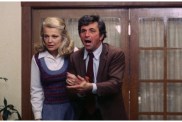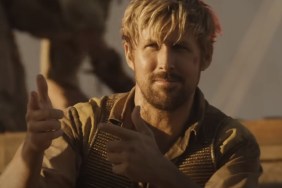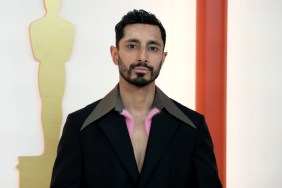
Director Gavin O’Connor crafts an unusual action hero with this Friday’s The Accountant
Movie fans looking for a different kind of action hero need look no farther than this Friday’s dramatic thriller The Accountant. Directed by Warrior‘s Gavin O’Connor, the Warner Bros. Pictures release stars Ben Affleck as Christian Wolff, a math savant whose unique training is revealed when he becomes the target of a deadly conspiracy.
RELATED: Ben Affleck Shoots to Kill in the New Accountant Movie Trailer
ComingSoon.net had the chance to sit down with Gavin O’Connor for a look behind the scenes of The Accountant and, in the below interview, we’re talking everything from Thai martial arts training to lightsabers! What’s more, O’Connor teases that, if audiences respond well to the character this weekend, The Accountant could wind up being the origin story entry in an ongoing franchise.
ComingSoon.net: Where did The Accountant really start for you?
Gavin O’Connor: Around 2011, I got sent the script and I loved it. I met with Lynette Howell, our producer, and Mark Williams, and we talked about the movie. I wanted to do it and it was at Warner Brothers. The head of Warner Brothers at the time had given it, unbeknownst to the producers, to someone else to direct. When they said, “We want Gavin to do it,” he was like, “I already gave it to someone else and he wants to do it!” So they had to call me up and tell me basically I was out. So it never happened under that regime. But then the option lapsed and the script took a circuitous route all around Hollywood. Eventually, it came back to me. At that time, it was setup in another studio, but the option was about to lapse again. I just said to those guys, “Can we just let the option lapse? Let’s roll up our sleeves and figure out how to make this movie without a studio.” Then, once we had all the elements we needed, we’d go take it to whoever we want to and finance it. But then we won’t be locked into a studio. We can decide. I got it to Ben [Affleck]. Ben loved it. He and I met. We talked. We decided to do it together. Then, once we had the great script, producers, me and Ben, it was like, “Okay, we can go make a movie now.” Ben had said to me, “Are you open to doing this with Warner Brothers? Because I had a deal there. I make all my movies there and I love them.” I was like, “Yeah, if you’re a filmmaker, they’re the studio to work at.” So we gave it to them and they said, “Go ahead and make the movie.” I’ve never had an experience where, once I had a script, it was so easy. We gave them the script, package, a budget and said, “This is a responsible budget.” They were like, “Go make the movie!” And that’s what we did.
CS: It seems like this is a film, that plays both as an action thriller, but that also has that very dramatic, real world drama side to it.
Gavin O’Connor: Well, budget informs certain things, but I also wanted to keep it grounded. I didn’t want to make an elevated kind of superhero movie. I wanted it to be grounded in a reality, so that was important to me. We’d go and we’d work on the script. We never touched the puzzle elements of the script. That was all in there and perfectly calibrated. We did some character work, action, and the flashbacks we changed with the writer, Bill [Dubuque].

CS: There are several narratives that are happening at once. At the beginning, they’re very separate. Is that something that plays out exactly as it does in the script or does the shifting perspective change a lot in the editing room?
Gavin O’Connor: No, because it’s such a puzzle and the script is so finely tuned and calibrated. There were things that just had to be hit at certain points, where you’re just sort of teasing out the information. I think that, as a director, what I was really going for was to lift it in regards to making the movie fun. I really wanted it to be a fun film, which was difficult. Like walking a bit of a razor’s edge. It was tricky tonally because of all the different elements and storylines running concurrently in the script. Then there’s the back story with the flashbacks, which are pretty soberingly intense.
CS: One of the things I really enjoyed is the fact that the Chris character is a bit of a nerd in the movie. He has comic books. He has a Master Replicas lightsaber by his bed. How did those pop culture elements come into play?
Gavin O’Connor: Most of that was already in the script. When I read it the first time, I was like, “This is so exuberantly, freshly conceived.” It was unlike anything I ever read. In Hollywood, there’s so much recycling of the same kind of ideas. It’s like, “Oh, that worked, let’s do that again.” This was so breathtakingly original that I wanted to tell that story. That’s a credit to Bill Dubuque. I mean, he wrote an incredible script. And a lot of those details were in the script.
CS: Is there a point where you have to call Lucasfilm and ask, “Can I have a lightsaber in my movie?”
Gavin O’Connor: I’d have to imagine someone did… I guess they got the rights from Disney. I don’t know. Someone did it.
CS: Can you tell me a little bit about the balance of portraying an autistic hero without turning the character into an exploitation of autism. Was that a fine line in figuring that out or was there a certain steadfast rule you had from the beginning?
Gavin O’Connor: That’s where we changed the flashbacks. My intention was that this was a father who didn’t know a lot about children on the spectrum. Back then, no one did. Parenting is not a sport for perfectionists. The only tools he has in his tool belt and the only philosophy that he can apply to raising a child was how he grew up and how he saw his own world, which was the world of the military. For him, it could be a very cruel world. How do you prepare for that? This is what he did. I’m not saying it’s right. I mean, we learn later that the reason Chris is basically donating all of this money is because he knows that there’s a better way. The thing that was important to me, though, was that he always know that everything his father would do was generated by love. It wasn’t like he watched him as a kid and he was just this mini-Bruce Lee. He was learning. He was being conditioned. He was taught how to survive and taught how to peel back the layers of aggression and taught how to survive under duress. He was conditioned to fight because his father thought that’s what this kid [needed].

CS: I quite like that it’s a very much a gray area. In many ways, he was abused having to go through these things but, at the same time, it’s not necessarily a negative in that it did prepare him for this life he winds up leading.
Gavin O’Connor: And by the way, it prepared Braxton as well. His brother got the same training and he’s using it, too. It’s just about how they were both raised, whether you were on the spectrum or not on the spectrum. They both were trained.
CS: How do you go about finding the right people for flashbacks like that? Is there an experimentation going back and forth with the adult actors to figure out what syncs up?
Gavin O’Connor: What we did was have an exhaustive search to find the two kids. They both had some martial arts background. For the dad, we auditioned a lot of actors and I just really liked [Robert C. Treveiler]. He just had this sort of energy about him. This William Holden kind of quality that I really liked. I just felt like he fit in that world, in that time. Then, once Ben and I got all the behaviors down, I would make sure Seth [Lee], who played young Ben, was now doing those behaviors. Seth didn’t come up with the behaviors. Ben and I came up with the behaviors. I actually did a screen test where I had Ben doing all the behaviors and then I would have Seth doing the exact same thing. Ben was teaching them all of the different behaviors. Then Seth just started working on that. He became a very method kind of actor. He was always in character, always doing the behaviors. That’s how we did it.
CS: Chris has an unusual regimen where he blasts loud music, flashes a strobe light and works on his legs with a wooden bar. What’s the practical side of each of those elements?
Gavin O’Connor: This comes out of Thailand. He’s blasting the music, which is because people on the spectrum don’t like loud music. By blasting music, you’re conditioning yourself to get used to something that is not innately something that you like. In Thai martial arts, they might roll bottles or sticks on their shins because you develop scar tissue. Guys who were fighters coud go and kick a piece of wood and it won’t even hurt their shin because they roll on it so much. It develops so much scar tissue and deadens all the nerves that you can fight. It comes out of martial arts, and that’s something that’s another part of who Chris is and what he does. He drills himself. He just conditions himself, blasting music and taking in things that are sensorially overloading. For fighting, that’s what you do.
CS: In the press conference, Ben Affleck talked about his philosophy of the director being god on a set. I’m curious when you sat down with him the first time, what was your conversation like, talking to both an actor and filmmaker?
Gavin O’Connor: Our first conversation was making sure we were aligned artistically. Him asking me a lot of questions about why I wanted to tell this story and what I was trying to say with the movie. What the intention of the film is. We had those conversations. Then, we talked about the character and some of the things that we wanted to try in this script without upsetting the puzzle of it, because we both thought it was brilliant. Then there were two things that were really important to me. I said to Ben, “You can’t just show up and play a guy with Asperger’s. I need to know that you’re going to be committed to the time that it’s going to require for us to do all the research so we can get this right and be authentic.” He said, “Absolutely. No, we’re not going to show up and do that. We need to really study.” Then, the other thing I said to him in regard to that was the same with the fighting. We don’t have a mask. When you have a mask, you can use a double a lot. We can’t do that, so you really have to invest in the fighting. He said, “Absolutely.” So once we got that out, I had one more question for him before we were done, and that was, “I think you’re a great director and I love your films, but let’s just have the conversation now. We can’t have two directors on the movie. It’s going to be a problem.” And Ben knows that because he’s a director. He was like, “Dude. I’m showing up to be an actor in your movie. That’s what we do.” He’s awesome. He’s great, great to work with.

CS: You’ve also got him paired with J.K. Simmons as well and they went on to work together in “Justice League.”
Gavin O’Connor: Yeah, that happened afterwards. I’ve always been a fan of JK’s. I happened to see “Whiplash” the Friday night it came out with my wife and two kids. I’m watching that movie and we were literally looking at each other going, “Oh my f–ing god. Do you see this?!” We were so blown away by the movie. I got out of the film and I called Lynette, my producer, and I said, “You gotta get me a meeting with J.K. Simmons. I want him to play Ray.” We sent him the script. He doesn’t live that far from me. We met in a coffee shop. After talking about it, we shook hands, and said “Let’s go do this together.” I got J.K. Simmons. I was happy as s–t because I love that guy. By the way, he’s a stud actor. A thing that I’ve learned when making movies is that you want to bring people in that have talent but that also have kindness. Because you can just get jerks and that’s the worst. So you bring people on that are going to bring all their talent and contribute artistically, but also contribute spiritually to the movie. You become this circus and you just want everyone to be there. We all had fun making the movie.
CS: Is that just a judgment call you’re making as the pre-production goes through? Or is there a process you try to figure out, is this person the right person? Is this person having a good day or a bad day?
Gavin O’Connor: I will never cast someone without meeting them first and just getting a sense of who they are as a person. Then, what I do is I always check them out. I call around because I think anybody can kind of bullsh*t their way through for an hour. But on a set, you can’t fake who you are. So I check them out. On this, every one of them got just hugely high grades. They’re all just really good people and great actors. Every day, even if someone’s in a bad mood. They might get a bad phone call or something’s happening with their kids, I mean, life just happens. You just deal with that. I’m just talking about their spirits, though. They’re all good, just really all solid people.
CS: I’m curious, do you look at The Accountant as a potential franchise?
Gavin O’Connor: If audiences decide that it should be, I would love that. Because I want to spend more time with Chris. There’s more to be explored with this character. What excites me is that, most franchises are IPs that people know about. Books or comic books and super heroes. This is entirely original and that’s what I loved about it. This is sort of his origin story. Even though no one has a comic book to read or a book to read or a graphic novel. This is all brand new for everybody. If it works and people want it and there’s an appetite for it, there’s more stories to be told.
Also starring Anna Kendrick, Jon Bernthal, Jean Smart, Cynthia Addai-Robinson, Jeffrey Tambor and John Lithgow, The Accountant opens in theaters this Friday, October 14.
The Accountant
-
The Accountant

-
The Accountant

-
The Accountant

-
The Accountant

-
The Accountant

-
The Accountant

-
The Accountant

-
The Accountant

-
The Accountant

-
The Accountant

-
The Accountant

-
The Accountant

-
The Accountant

-
The Accountant

-
The Accountant

-
The Accountant

-
The Accountant

-
The Accountant

-
The Accountant

-
The Accountant

-
The Accountant

-
The Accountant

-
The Accountant

-
The Accountant

-
The Accountant

-
The Accountant

-
The Accountant

-
The Accountant

-
The Accountant

-
The Accountant

-
The Accountant

-
The Accountant

-
The Accountant

-
The Accountant

-
The Accountant

-
The Accountant

-
The Accountant

-
The Accountant

-
The Accountant

-
The Accountant










